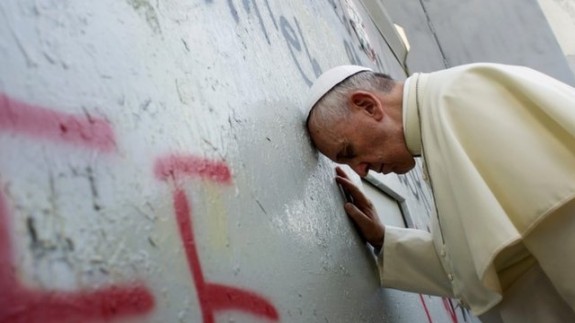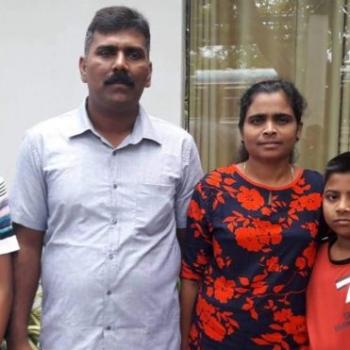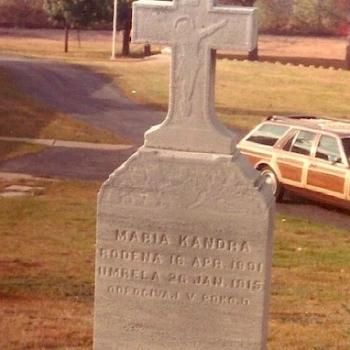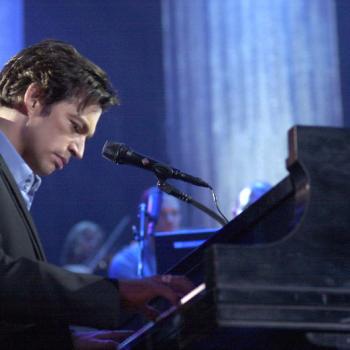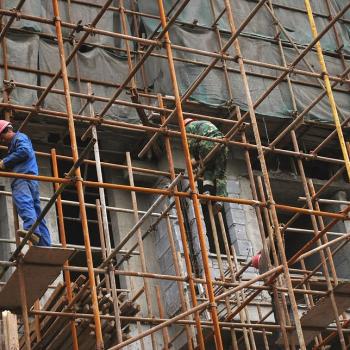A common question among some Christians is “WWJD?” What would Jesus do?
Maybe we need to start asking ourselves “WWFD?” What would Francis do?
We find the answer to that question again and again in his trip last weekend to the Holy Land.
Before leaving Rome, he visited the Basilica of St. Mary Major for a few minutes to do something very simple—but vitally important.
He prayed.
After arriving in the Holy Land, while traveling through the West Bank, he asked his motorcade to stop, and he got out of his car. He walked over to the concrete separation wall, a symbol of division and fear and hardship, and he placed his hand against the concrete, and bowed his head.
And he prayed.
Visiting Yad Vashem, the memorial to the victims of the Holocaust, he stood before a flame burning with memory and meaning.
And he prayed.
In the church of the Holy Sepulcher, the site where Jesus suffered, died and was buried, he knelt beside the Ecumenical Patriarch, and together they kissed the stone on which the body of Christ was anointed.
And he prayed.
In a stunning development that made news around the world, he invited the president of Israel and the president of Palestine to come to the Vatican – not to negotiate, or mediate. But simply to pray. They both accepted. They will join the Holy Father in Rome next Sunday.
Once again, Pope Francis will pray.
Pope Francis made his pilgrimage a prayer. And in doing that, he was doing something that reaches back to the very beginning of our faith. As the scripture reminds us today, in the days between Christ’s Ascension and Pentecost, the disciples went back to Jerusalem and “devoted themselves with one accord to prayer.” Before all else, there was, and there is, prayer.
It is the starting point for every great work.
And it’s something especially meaningful right now. These days on our Christian calendar might be considered a kind of mini-Advent, in which we wait for something to born—and that something, of course, is the Church. Embers are being stirred, sparks are waiting to ignite. Soon, the fire will fall.
But for now, like the apostles, we wait.
And we pray.
I think we often misunderstand what this simple act means. We take prayer for granted. “Pray for me,” we ask people during tough times. “I’ll pray for you,” we tell people when we want them to know we’re thinking of them.
But do we really get what prayer is?
Sometimes, we look at prayer as a sacred wishing well. We toss in our hopes and desires and wait for God to give them to us. “God, help me get a raise…help me pass this test…make the lump benign.”
And then we are angry or disappointed when we don’t get what we wanted – thinking that God has not heard us or not answered us.
He does hear. He does answer. Sometimes, it’s just not the answer we wanted. Sometimes, he gives us desires that can’t be fulfilled, plans that can’t be carried out, ideas that will never be what we hoped. The raise doesn’t come through. We fail. The lab tests tell us what we didn’t want to hear.
It is hard to understand, sometimes impossible to accept, that a God who loves us allows these things into our lives.
But the God who permits pain is the same God who knew the pain of watching his own son suffer and bleed and die.
But there was a purpose. Out of that came Easter. Out of that came our salvation.
During his trip to the Western Wall in Jerusalem—one of the most sacred sites in the world—Pope Francis slipped into the wall a piece of paper on which he’d scrawled a simple prayer, one every Christian knows: The Lord’s Prayer, the Our Father. It contains what may be the four most difficult words in our faith.
“Thy will be done.”
The most important prayer we can offer, I think, is exactly that: God, help me to accept what you want for me. Help me to live the life YOU want for me—not the one I want.
In John’s gospel this morning, we hear once again Jesus’s prayer at the Last Supper to his father. It is a prayer not for himself, but for his apostles.
“I pray for them,” he says. “I do not pray for the world but for the ones you have given me, because they are yours.”
I think Jesus was not just praying for the people he had dinner with that night.
He was also praying for us—all of us, across the centuries. All who believe, who wonder, who fear, who rage, who doubt. All of us who pray. We are his. We cannot forget that.
Last Christmas, a friend gave me a beautiful little book, “A Prayer Journal” by Flannery O’Connor, one of the great Catholic writers of the last century. She died tragically young, of lupus, at the age of 39. When she was studying writing at the University of Iowa, Flannery O’Connor kept a spiritual journal in one of those plain soft-covered black-and-white composition books, the kind we all had in school. It contains some of the most honest, heart-felt prayers I’ve ever read.
“I would like to write a beautiful prayer,” she scribbles at one point—and you realize she is talking about her life. And addressing her words to God, she pleads: “Don’t let me ever think Dear God, that I was anything but the instrument for Your story. Just like the typewriter was for mine….Take me, dear Lord, and set me in the direction I am to go.”
I can think of no prayer more plain, or more beautiful, or more universal. It is another way of saying, “Thy will be done.”
Which, I think, was undoubtedly the prayer of the apostles in the days before Pentecost, as they waited in the Upper Room for something, and someone, they couldn’t really name or explain.
All of us, in one way or another, are in our own Upper Room. All of us are waiting, anxious for a future we can’t see. We huddle together, wondering what God has planned.
What would Pope Francis do? WWFD? I think he gave us the answer.
Let us make of these days, and make of our lives, a prayer—a prayer of hope, confident in God’s loving plan for each of us.
“Thy will be done.”
As Flannery O’Connor put it: we ask to be instruments of God’s great story.
Take me, dear Lord, and set me in the direction I am to go.

